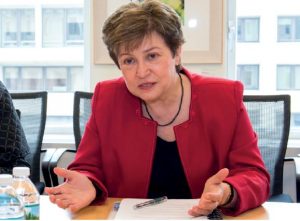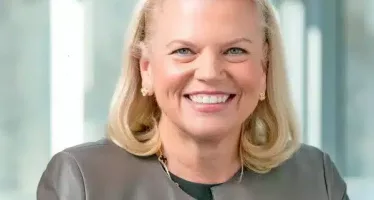Kristalina Georgieva
 The little blue Audi TT with its stick shift had to be sacrificed to a small electric VW: “I need to go electric. We all have this responsibility.” The commute may be slightly less exciting, World Bank CEO Kristalina Georgieva is at her desk at 7:30 am sharp to put in twelve hours or more. A workaholic, perhaps, Mrs Georgieva wouldn’t have it any other way. Hers is a job that includes finding solutions to some of the world’s most intractable challenges – how to lift millions out of poverty without destroying the global habitat in the process.
The little blue Audi TT with its stick shift had to be sacrificed to a small electric VW: “I need to go electric. We all have this responsibility.” The commute may be slightly less exciting, World Bank CEO Kristalina Georgieva is at her desk at 7:30 am sharp to put in twelve hours or more. A workaholic, perhaps, Mrs Georgieva wouldn’t have it any other way. Hers is a job that includes finding solutions to some of the world’s most intractable challenges – how to lift millions out of poverty without destroying the global habitat in the process.
Mrs Georgieva arrived at the World Bank Group (WBG) from the European Commission where she managed a €161bn budget and an almost 30,000-strong staff as vice-president for Budget and Human Resources between 2014 and 2016. Prior to that, she led the EC commissariat for International Cooperation, Humanitarian Aid, and Crisis Response. Mrs Georgieva, who gained a solid reputation as an effective administrator, is not a stranger to the World Bank Group. Between 1993 and 2010, she held a number of jobs at the Washington-based institution, including director of Sustainable Development and vice president. In the latter role she served as a vital link between the bank’s shareholder states, its board, and its senior management.
Though the CEO position is newly created, Mrs Georgieva effectively replaced World Bank Managing Director and Chief Operating Officer Sri Mulyani Indrawati who was appointed Indonesian finance minister in July 2016.
Brought on board by WBG president Jim Yong Kim after an administrative shake-up that aimed to improve the bank’s efficiency in fighting extreme poverty, Mrs Georgieva is to spearhead a concerted effort to increase the institution’s effectiveness and agility – measuring actual project outcomes against a set of well-established benchmarks.
Born in Sofia, Bulgaria, Mrs Georgieva holds a PhD in Economic Science and an MA in Political Economy and Sociology from the University of National and World Economy. She was an associate professor at her alma mater between 1977 and 1991.
Consolidating a shift in culture, Mrs Georgieva has managed to make inroads into the WBG’s stratified bureaucracy, halving the frequency of regular meetings, and insisting on a significantly reduced wordcount for policy paper and project documents whilst limiting the attached comment section. Instead, Mrs Georgieva wants to break down silos and see more collaboration between different parts of the group in order to make better use of the WBG’s undeniably large reservoirs of knowhow. The effort, a gargantuan one, aims to make the World Bank more result-oriented and thus deliver – in plain English – a better bang for the development buck.
Responsible for the World Bank’s two large lending entities, the International Bank for Reconstruction and Development (IBRD) and the International Development Association (IDA), Mrs Georgieva’s job is to implement the strategy outlined in the Forward Look – A Vision for the World Bank Group to raise to incomes of the poorest 40% of the world population by 2030, reducing the incidence of extreme poverty to less than 5% (versus 14.5% in 2011).
With only thirteen years left to go, a flexible, highly responsible, and original approach is called for. Mrs Georgieva moved quickly to give her full support to the Agile Bank Programme, initiated just a few months before her arrival in Washington. The programme selects nine “agile fellows” from different parts of the World Bank Group to spend a year brainstorming on how to streamline the institution and make it more nimble, innovative, and responsive.
The agile fellows have already come up with a set of flexible lending guidelines to adjust funding levels as development projects take shape, dynamically responding to possible changes on the ground. Mrs Georgieva reported that the Agile Bank Programme was welcomed by WBG staff, almost going viral with staff questioning established procedure and embracing out-of-the-box thinking. And that is precisely what WBG CEO Kristalina Georgieva requires – a new and more effective approach to development finance and eradicating poverty.
You may have an interest in also reading…
Otaviano Canuto & Matheus Cavallari, World Bank: Bloated Central Bank Balance Sheets
Central banks of large advanced and many emerging market economies have recently gone through a period of extraordinary expansion of
Nordea’s Sasja Beslik on Davos 2015: Rising Inequality Unsustainable, Inclusiveness Answer
Davos – A participant of earlier World Economic Forum (WEF) meetings in Davos, Sasja Beslik, head of Responsible Investment and
Ginni Rometty, former IBM boss
It was a Man’s World — but it‘Wouldn’t be Nothing’ Without A Woman like Ginni Rometty… ‘Teaching, hiring and advancing


















































































